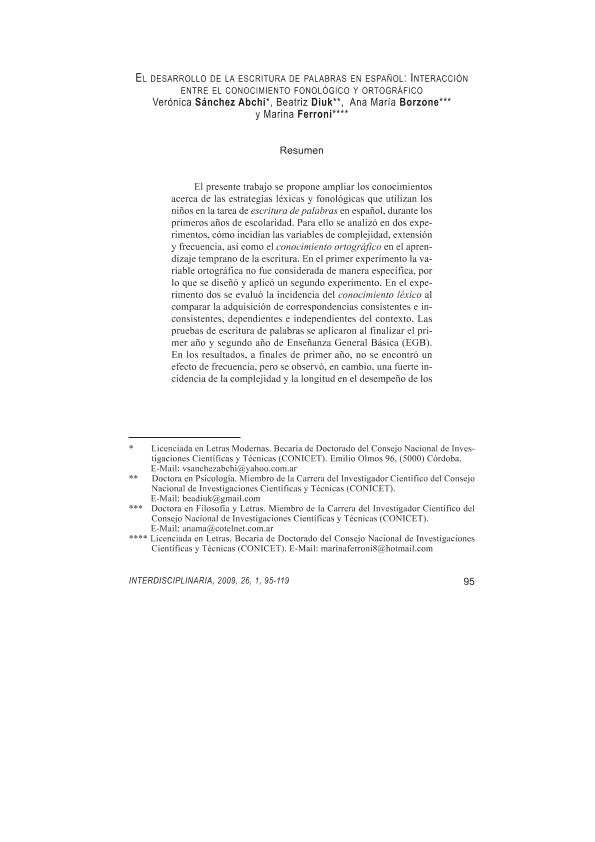Artículo
Este trabajo se propone ampliar los conocimientos acerca de las estrategias que utilizan los niños en la tarea de escritura de palabras en español. Para ello se analizó, en dos experimentos, de qué manera incidían las variables de complejidad, extensión y frecuencia de las palabras en la escritura al dictado. Asimismo, se analizó la interacción entre las variables fonológicas y el conocimiento ortográfico en el aprendizaje temprano de la escritura. Se aplicaron pruebas de escritura de palabras a 59 niños al finalizar el primer año y nuevamente al terminar el segundo año de la EGB. Los resultados mostraron que los mecanismos fonológicos son fundamentales en la primera etapa de aprendizaje de la escritura. Al finalizar el 2do año escolar se observó también una interacción entre los mecanismos fonológicos y léxicos. This study analyzed the acquisition of word spelling strategies in Spanish-speaking children, during the first two years of elementary education. The cognitive word spelling models, initially developed for English, describe different stages in the acquisition spelling process. In the first stage, children write by memory, reproducing visual cues. At a second stage, children analyze the phonological structure of the word. Finally, in an orthographic stage, children can write words, using lexical information, without phonological mediation (Frith, 1984, 1985; Marsh, Friedman, Welch & Desberg, 1980). Even when the stages theory was discussed, these first studies allowed the identification of early lexical strategies and phonological mechanisms implied in the English word spelling processes. However, English is a language with a deep orthography, and the phonological strategy is a necessary mechanism but it is not enough to spell words properly. On the contrary, the Spanish orthographic system is shallow, and the phonemes-graphemes correspondences are very regular. Consequently, the spelling strategies could be different in these two languages, and the models developed for English would partially explain the orthographic learning process in transparent languages.
This work aims to contribute to the knowledge on early spelling word strategies in Spanish. In two experiments, first and second grade children were given spelling tests designed to explore their phonological and orthographic knowledge. In the first experiment, the incidence of word complexity, length and frequency on spelling performance was explored. However, there was a possibility that, if children performed better in frequent words spelling, in relation to less frequent, they were resorting to their lexical knowledge. In this case, children were using an orthographic-lexical strategy. On the other hand, the possibility of writing complex and long words is associated to the phonological awareness level and correspondence knowledge. If children were able to easily write frequent and non frequent short and simple words, but had difficulties in writing long and complex words, they were possibly analyzing the sounds of the words and thus activating the corresponding letters. If the word was long or complex and the phonological skills were not well developed, children would have difficulties in writing them; one such problem, for example, would be in omitting letters. In this case, complexity and length variables that show the use of an analytic strategy would be influencing the performance. In the first experiment, the orthographic variable was not considered specifically, so a second experiment was designed. The second experiment evaluated orthographic knowledge, considering the orthographic characteristics of the words. The acquisition of the consistent and inconsistent correspondences was compared. The consistent correspondences could be solved using transcription rules, while inconsistent correspondences could be written only through lexical knowledge.
Furthermore, consistent correspondences could be independent or dependent from context. In the first case, we refer to phonemes that are always represented with the same letter. In the other case, transcription depends on the syllabic context.
Tests were applied at the end of the first and the second year of primary education. Results of the first experiment showed that, at the end of the first year, there was no frequency effect but the variables of complexity and length affected the children's performance. At the end of the second year, a frequency effect and a significant interaction between complexity and frequency were found. In the second experiment, a significant consistence effect was observed, but there was no frequency effect. These results indicate that phonological strategies are fundamental in the beginning of spelling acquisition. On the contrary, lexical mechanisms appear later and they are acquired gradually. Indeed, at the end of the first grade, frequency only affected performance of context dependent correspondences, but not independent. Likewise, interaction between phonological and lexical strategies was found only at the end of the second year. Pedagogical implications were also considered.
El desarrollo de la escritura de palabras en español: Interacción entre el conocimiento fonológico y ortográfico
Título:
Spelling development in Spanish: Interaction between phonological and orthographic knowledge
Sanchez Abchi, Veronica Soledad ; Diuk, Beatriz Graciela
; Diuk, Beatriz Graciela ; Borzone, Ana Maria
; Borzone, Ana Maria ; Ferroni, Marina Valeria
; Ferroni, Marina Valeria
 ; Diuk, Beatriz Graciela
; Diuk, Beatriz Graciela ; Borzone, Ana Maria
; Borzone, Ana Maria ; Ferroni, Marina Valeria
; Ferroni, Marina Valeria
Fecha de publicación:
07/2009
Editorial:
Centro Interamericano de Investigaciones Psicológicas y Ciencias Afines
Revista:
Interdisciplinaria
ISSN:
0325-8203
e-ISSN:
1668-7027
Idioma:
Español
Tipo de recurso:
Artículo publicado
Clasificación temática:
Resumen
Archivos asociados
Licencia
Identificadores
Colecciones
Articulos(CCT - CORDOBA)
Articulos de CTRO.CIENTIFICO TECNOL.CONICET - CORDOBA
Articulos de CTRO.CIENTIFICO TECNOL.CONICET - CORDOBA
Articulos(CIIPME)
Articulos de CENTRO INTER. DE INV. EN PSICOLOGIA MATEMATICA Y EXP. "DR. HORACIO J.A RIMOLDI"
Articulos de CENTRO INTER. DE INV. EN PSICOLOGIA MATEMATICA Y EXP. "DR. HORACIO J.A RIMOLDI"
Articulos(SEDE CENTRAL)
Articulos de SEDE CENTRAL
Articulos de SEDE CENTRAL
Citación
Sanchez Abchi, Veronica Soledad; Diuk, Beatriz Graciela; Borzone, Ana Maria; Ferroni, Marina Valeria; El desarrollo de la escritura de palabras en español: Interacción entre el conocimiento fonológico y ortográfico; Centro Interamericano de Investigaciones Psicológicas y Ciencias Afines; Interdisciplinaria; 26; 1; 7-2009; 95-119
Compartir



